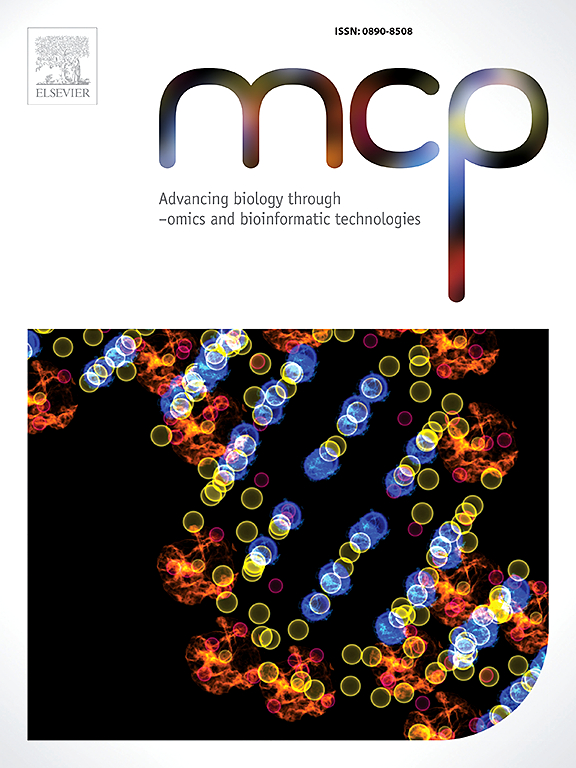Exploiting network-based drug repositioning to target metastasis in colorectal cancer: In-Silico prediction and in-vitro evidence
IF 3
3区 生物学
Q3 BIOCHEMICAL RESEARCH METHODS
引用次数: 0
Abstract
Metastasis is a major challenge in colorectal cancer (CRC) treatment. The incidence of regional and distant stages has increased during the past decade and the 5-year survival of metastatic CRC patients is 20 %. Although there is a necessity to develop systematic treatment, the cost and time of novel drug discovery hinder this progress. Drug repositioning simplifies this process by accelerating regulatory processes in drug discovery. Here we used a systems biology approach to find key player genes in the metastasis. First, we found differentially expressed genes in metastatic tissue compared to primary tumors. Then, we constructed and analyzed the protein-protein interaction (PPI) network to find hub genes and subjected them to query in the DrugBank database. We found plasminogen (PLG) is the hub gene in the constructed PPI network and tranexamic acid (TXA) is its known inhibitor with clinically approved antifibrinolytic activity. Pathway enrichment analysis showed that PLG is involved in matrix remodeling, Platelet activation, and cell energy production through insulin-growth factor uptake in colorectal cancer cells which are important processes during metastasis. We further explored the CPTAC-COAD proteomics data and found that the PLG level is significantly higher in stage IV compared to stage I. Interestingly, we found that PLG is correlated with mutation rate. We then investigated the effect of TXA on SW480 cells' mobility and migration by scratch assay and transwell migration assay. Both assays indicated that TXA can significantly inhibit the cells’ migratory potential.
利用基于网络的药物重新定位靶向结直肠癌转移:计算机预测和体外证据。
转移是结直肠癌(CRC)治疗的主要挑战。在过去十年中,局部和远处分期的发生率有所增加,转移性CRC患者的5年生存率为20%。虽然有必要开发系统的治疗方法,但新药发现的成本和时间阻碍了这一进展。药物重新定位通过加速药物发现的监管过程简化了这一过程。在这里,我们使用系统生物学方法来寻找转移的关键基因。首先,我们在转移组织中发现了与原发肿瘤相比的差异表达基因。然后,我们构建并分析了蛋白质-蛋白质相互作用(PPI)网络来寻找枢纽基因,并将其在DrugBank数据库中进行查询。我们发现纤溶酶原(PLG)是构建的PPI网络中的枢纽基因,氨甲环酸(TXA)是其已知的抑制剂,具有临床批准的抗纤溶活性。途径富集分析表明,PLG参与结肠直肠癌细胞基质重塑、血小板活化和通过胰岛素生长因子摄取产生细胞能量,这些都是转移过程中的重要过程。我们进一步研究了CPTAC-COAD蛋白质组学数据,发现PLG水平在IV期明显高于i期。有趣的是,我们发现PLG与突变率相关。然后,我们通过划痕实验和transwell迁移实验研究了TXA对SW480细胞迁移和迁移的影响。两项实验均表明,TXA能显著抑制细胞的迁移潜能。
本文章由计算机程序翻译,如有差异,请以英文原文为准。
求助全文
约1分钟内获得全文
求助全文
来源期刊

Molecular and Cellular Probes
生物-生化研究方法
CiteScore
6.80
自引率
0.00%
发文量
52
审稿时长
16 days
期刊介绍:
MCP - Advancing biology through–omics and bioinformatic technologies wants to capture outcomes from the current revolution in molecular technologies and sciences. The journal has broadened its scope and embraces any high quality research papers, reviews and opinions in areas including, but not limited to, molecular biology, cell biology, biochemistry, immunology, physiology, epidemiology, ecology, virology, microbiology, parasitology, genetics, evolutionary biology, genomics (including metagenomics), bioinformatics, proteomics, metabolomics, glycomics, and lipidomics. Submissions with a technology-driven focus on understanding normal biological or disease processes as well as conceptual advances and paradigm shifts are particularly encouraged. The Editors welcome fundamental or applied research areas; pre-submission enquiries about advanced draft manuscripts are welcomed. Top quality research and manuscripts will be fast-tracked.
 求助内容:
求助内容: 应助结果提醒方式:
应助结果提醒方式:


